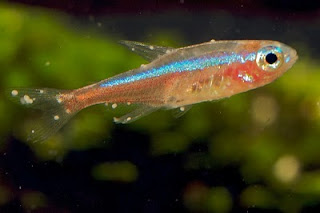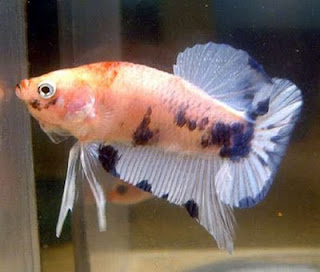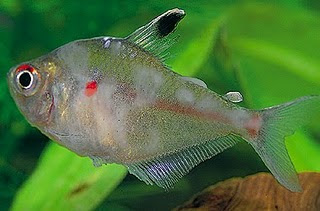 White spot or Ich (ick) as it is also known is one of the more common diseases found in fresh water aquarium fish. Ich is a protozoan disease. The scientific name for the disease is Ichthyophthiriasis. It is wide spread in all fresh water fish, but is more common in aquarium fish, most likely because they live in close contact with other species and because of stress.
White spot or Ich (ick) as it is also known is one of the more common diseases found in fresh water aquarium fish. Ich is a protozoan disease. The scientific name for the disease is Ichthyophthiriasis. It is wide spread in all fresh water fish, but is more common in aquarium fish, most likely because they live in close contact with other species and because of stress. Black Spot Disease caused by the larvae of parasitic digenetic flukes, Cercaria and Metacercaria. This disease is caused by a parasite (larval trematode) that burrows into the skin of a fish causing the formation of a cyst approximately one millimeter in diameter. In general, even heavy infestations of these parasites do relatively little damage to the fish. Fish with heavy infestations on the eyes may be blinded.
Black Spot Disease caused by the larvae of parasitic digenetic flukes, Cercaria and Metacercaria. This disease is caused by a parasite (larval trematode) that burrows into the skin of a fish causing the formation of a cyst approximately one millimeter in diameter. In general, even heavy infestations of these parasites do relatively little damage to the fish. Fish with heavy infestations on the eyes may be blinded.The term "Black Spot" refers to the formation of small cysts in the muscle and skin around which the parasite lives. The cyst accumulates black pigment cells. These cause little harm to the fish. Young fish have growth problems if heavily infected.
 Chilodonella is a single cell microscopic parasite that attacks a fish skin and gills. Later the skin may be broken down and the gills destroyed. The fish will rub against objects and become inactive. The fish may also behave like they have irritations, by glancing off aquarium decor, they may have clamped fins and difficulty breathing. If the gills are affected they will stay near the water surface and gasp for air. Cloudy spots develop on the skin. The skin patches turn white and begin to disintegrate and usually over a couple day period. This opens the door to secondary infections and/or fungus.
Chilodonella is a single cell microscopic parasite that attacks a fish skin and gills. Later the skin may be broken down and the gills destroyed. The fish will rub against objects and become inactive. The fish may also behave like they have irritations, by glancing off aquarium decor, they may have clamped fins and difficulty breathing. If the gills are affected they will stay near the water surface and gasp for air. Cloudy spots develop on the skin. The skin patches turn white and begin to disintegrate and usually over a couple day period. This opens the door to secondary infections and/or fungus.


No comments:
Post a Comment